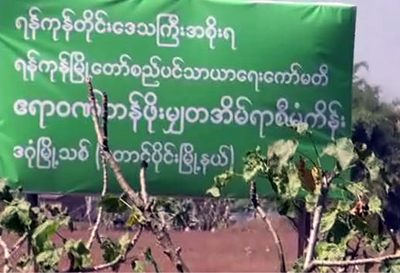Farmers coerced to grow jatropha by Burma’s former military junta are now suffering enormous losses after the new government abandoned the project with no apparent exit strategy.
In 2005, Snr-Gen Than Shwe launched a nationwide initiative to promote the production of jatropha, commonly called ‘physic nut,’ a plant that can be refined into biofuel. Over the following years state media ran an ongoing propaganda campaign urging all citizens to farm the shrub in any unused space, calling it a “national duty”. The initiative was meant to be a quick-fix for the nation’s dire fuel shortage.
Residents of Rangoon’s South Dagon Township said that their jatropha farms, which they began cultivating in 2006 by order of the State Peace and Development Council (SPDC), are now producing the plant in abundance – but it is economically barren because the government dropped the biofuel scheme, leaving farmers with a wealth of crops that have no other practical use.
“We are making no profit at all – [the SPDC] told us to grow jatropha plants and build refineries to produce oil, which we did,” said Nu Nu Yi, a farmer in South Dagon Township.
“They said we would be rich,” she added.
[related]
The jatropha scheme was administered by several members of the new reformist administration, including President Thein Sein, previously a senior military commander.
“My farm was opened in a ceremony by [now-president] Thein Sein, who planted the first shrub. The ceremony was also attended by Maj-Gen Hla Htay Win [now Military Chief of General Staff], and Rangoon Division Governor Myint Swe [now regional Chief Minister],” said U Sint, another jatropha farmer in South Dagon Township.
The farms in Rangoon were originally managed by the Department of Human Settlement and Housing Development, later to be handed over to the Yangon [Rangoon] City Development Committee, which now plans to replace them with the Irrawaddy Low-Cost Housing Project. The farmers were never officially notified of the scheme’s dissolution.
“We were never informed about suspension of the project, for which we were given 45-year tenant permits. Now they [Rangoon Region Government] are planning building projects with construction companies without negotiating with us,” said U Sint.
The farmers, hoping to be compensated, met with municipal authorities in August 2013, but no action ensued to address their losses.
The 2005 initiative was implemented by employing antiquated clauses of Burma’s land management laws, which have since been reformed. However, even the revised land laws of 2012 preserve the government’s right to mandate how land is used if deemed to be “in the long-term national interest of the State”.



